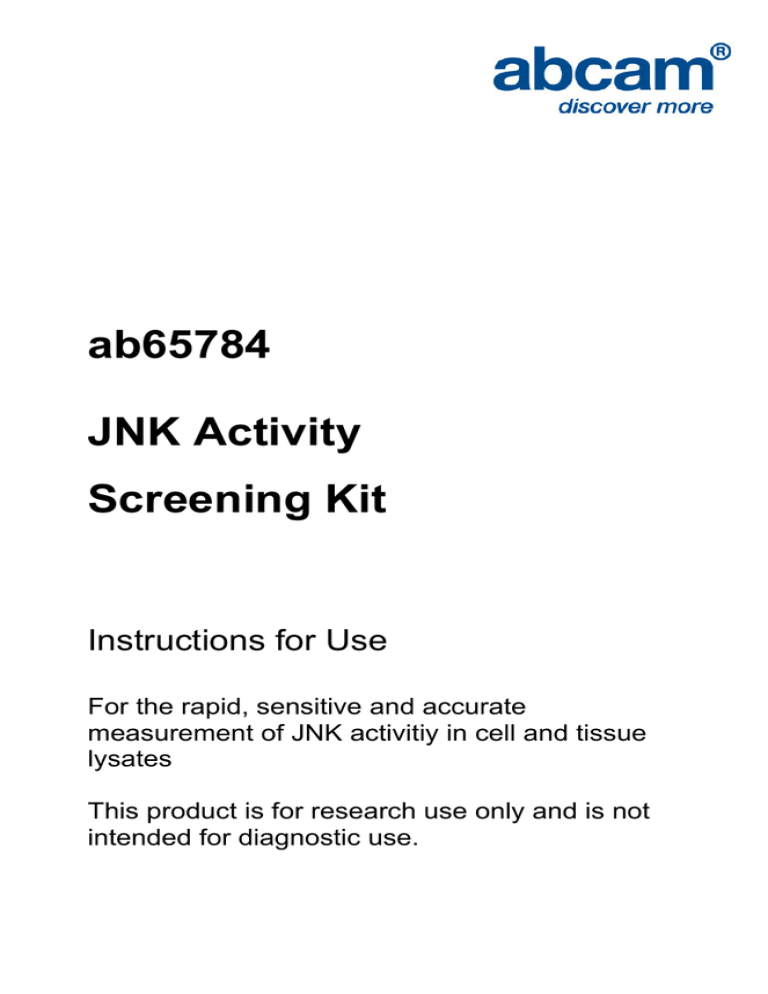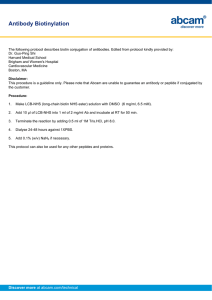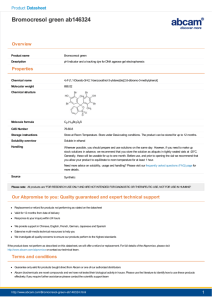ab65784 JNK Activity Screening Kit Instructions for Use
advertisement

ab65784 JNK Activity Screening Kit Instructions for Use For the rapid, sensitive and accurate measurement of JNK activitiy in cell and tissue lysates This product is for research use only and is not intended for diagnostic use. 1 Table of Contents 1. Overview 3 2. Protocol Summary 3 3. Components and Storage 4 4. Assay Protocol 5 5. Data Analysis 6 2 1. Overview c-Jun N-terminal kinase (JNK) is one of the several main MAP kinase groups identified in mammals. Recent evidences suggest that activation of JNK may play an important role in neuronal apoptosis and other physiological and pathological processes. Abcam’s JNK Activity Screening Kit utilizes an N-terminal c-Jun (1-79) fusion protein bound to glutathion sepharose beads to selectively “pull down” JNK from cell lysates. After washing to remove non-specifically bound proteins, the kinase reaction is then carried out in the presence of cold ATP. c-Jun phosphorylation is then measured by Western blot analysis using a phospho-c-Jun specific antibody. 2. Protocol Summary Sample Preparation JNK “Pull Down” Add ATP Perform Western Blot Analysis 3 3. Components and Storage A. Kit Components Item Quantity Kinase Extraction Buffer 80 mL c-Jun (1-79) Fusion Protein Beads 0.8 mL Kinase Assay Buffer 25 mL ATP (10 mM) 50 µL Phospho-cJun Specific Antibody 50 µL * Store the kit at-20°C. B. Additional Materials Required 3X SDS-PAGE Buffer Microcentrifuge Pipettes and pipette tips 96 well plate Orbital shaker 4 4. Assay Protocol 1. Sample Preparation a) Activate cells by desired methods. Concurrently incubate a negative control culture without activation. To generate a positive control, cells can be treated with 1 μg/ml of Anisomycin (ab120495) for 1 hr, before harvesting. b) Pellet cells (2-10 million/assay) and wash once in 1X ice-cold PBS. c) Lyse cells in 200 μl ice-cold JNK Extraction Buffer. Incubate on ice for 5 min. d) Pellet at 13,000 rpm for 10 min at 4°C. Transfer supernatant (This is the Cell Lysate) to a new tube. e) Assay protein concentration of the Cell Lysate. The Cell Lysate can be used immediately or freeze at -80°C for future use. 2. JNK “Pull Down”: For each assay, add 20 μl c-Jun Fusion Protein Beads to 200 μl Cell Lysate (~50-400 μg total protein). Incubate with gentle rocking overnight at +4°C. 5 Microcentrifuge for 30 seconds (14,000 rpm) at +4°C. Remove Supernatant. Wash pellet twice with 0.5 ml of 1X Kinase Extraction Buffer and one time with 0.5 ml Kinase Assay Buffer. Keep on ice. 3. Kinase Assay: a) Suspend pellet in 50 μl Kinase Assay Buffer. Add 1 μl of 10 mM ATP. Incubate for 30 min at 30°C. b) Add 30 μl 3X SDS-PAGE Buffer (not provided). c) Boil the samples for 3 min. Microcentrifuge for 2 min. d) Load the supernatant (20 μl) on 12% SDS-PAGE. Alternatively, the supernatant may be stored at -20°C for future use. 5. Data Analysis Perform Western blot analysis using the rabbit anti-Phospho-cJun (Ser 73) Specific Antibody at 1:1000 dilution. A 35 kDa band corresponding to the phosphorylated c-Jun protein should be detected in JNK activated samples. For further technical questions please do not hesitate to contact us by email (technical@abcam.com) or phone (select “contact us” on www.abcam.com for the phone number for your region). 6 UK, EU and ROW Email: technical@abcam.com Tel: +44 (0)1223 696000 www.abcam.com US, Canada and Latin America Email: us.technical@abcam.com Tel: 888-77-ABCAM (22226) www.abcam.com China and Asia Pacific Email: hk.technical@abcam.com Tel: 108008523689 (中國聯通) www.abcam.cn Japan Email: technical@abcam.co.jp Tel: +81-(0)3-6231-0940 www.abcam.co.jp 7 Copyright © 2012 Abcam, All Rights Reserved. The Abcam logo is a registered trademark. All information / detail is correct at time of going to print.


